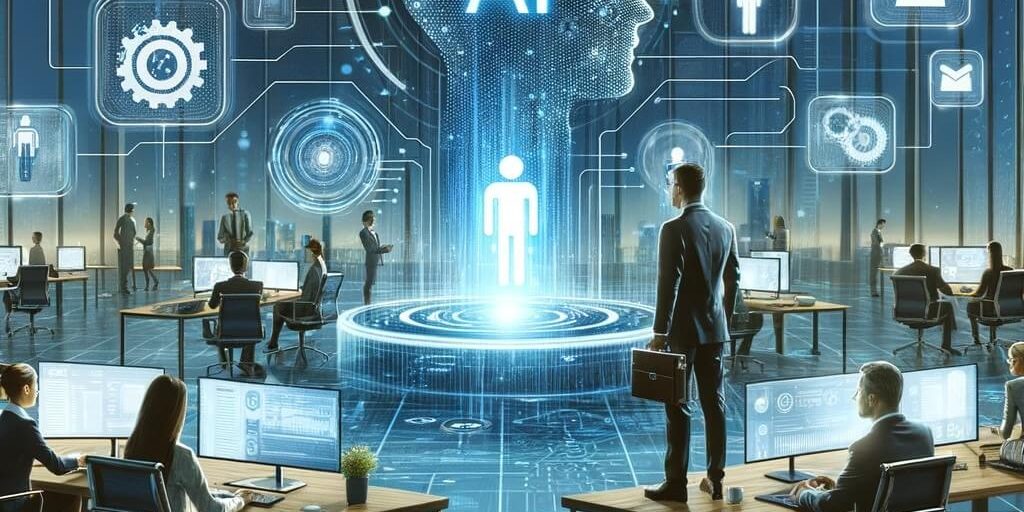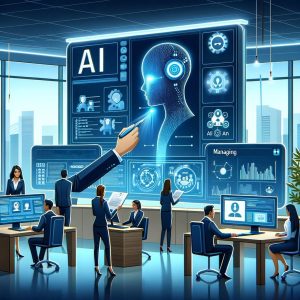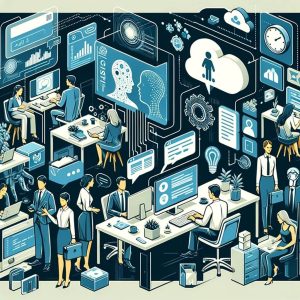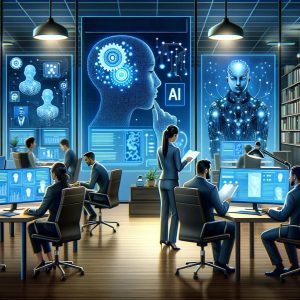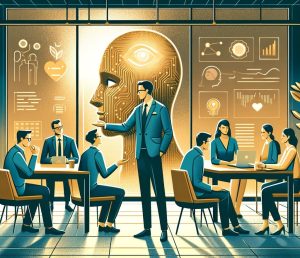The integration of artificial intelligence into human resources has sparked a significant debate: is AI a friend or foe to the HR profession? This integration presents both opportunities and challenges, reshaping how HR functions are performed and redefining the role of HR professionals. AI’s capabilities are not only streamlining processes but also enhancing the efficacy and precision of these critical HR functions.
AI in streamlining HR processes
AI’s role in transforming HR processes cannot be overstated. AI-driven tools can scan through resumes and applications efficiently, identifying candidates who best match the job requirements. This automation speeds up the recruitment process and reduces the likelihood of human bias.
AI applications in HR extend to employee management as well. AI systems can analyse employee data to provide insights into workforce trends, predict employee turnover, and identify areas for employee development. Routine tasks like scheduling, answering employee queries, and managing administrative duties can also be automated using AI, leading to increased operational efficiency.
AI in talent acquisition
The use of AI in talent acquisition is revolutionizing the way organizations approach the recruitment process. AI algorithms can sift through vast numbers of applications quickly, identifying candidates who best match the job specifications. This automation significantly reduces the time and effort involved in screening candidates, leading to more efficient recruitment cycles.
AI-driven recruitment tools can analyse a candidate’s resume, assess their online presence, and even evaluate their responses in preliminary interviews. This holistic analysis helps in identifying candidates who not only have the required skills and experience but also fit the company culture. AI can also mitigate unconscious biases in the recruitment process by focusing on data-driven criteria, promoting diversity in hiring.
AI in talent development
In talent development, AI is proving to be a game-changer. AI-powered platforms can offer personalized learning experiences to employees by adapting content according to individual learning styles, performance, and progress. These platforms can analyse employee engagement and learning outcomes, providing insights to HR professionals for optimizing learning strategies.
AI tools can track the development of employees, recommending tailored training programs and career development paths. They can predict future skill requirements and identify skill gaps within the organization, enabling proactive planning for workforce development.
Enhancing employee experience and engagement
AI technologies are also being used to enhance the overall employee experience. Chatbots and virtual assistants can provide employees with quick and easy access to HR-related information. AI-driven analytics can help in customizing employee benefits, training programs, and career development paths based on individual preferences and performance.
AI-driven career development tools can assist employees in setting career goals and identifying pathways to achieve them. Gamified learning experiences, powered by AI, make training more interactive and enjoyable, leading to higher engagement levels
The human element in HR
Despite these advancements, the human element in HR remains irreplaceable. Human judgment, empathy, and emotional intelligence are crucial in understanding and managing complex employee relations and organizational dynamics. AI lacks the ability to comprehend the subtleties of human emotions and the nuances of workplace culture.
HR professionals are essential for interpreting data provided by AI in a meaningful way, ensuring that the insights gained are aligned with the organization’s values and culture. They play a vital role in decision-making processes where ethical considerations, company culture, and employee well-being are at stake. Human judgment is essential also in interpreting AI-generated data, making final hiring decisions, and understanding the unique aspects of each candidate or employee.
Leveraging AI in recruitment and talent development
AI in HR is more of an ally than a foe. It enhances efficiency, provides valuable insights, and automates routine tasks, which can transform HR practices. However, the human aspect of HR – understanding, empathy, and strategic thinking – remains crucial. The future of HR will likely see a symbiotic relationship between AI and human professionals, where each complements the other’s strengths, leading to a more dynamic, responsive, and effective HR function.
The integration of AI into HR is not merely about automating tasks; it is about augmenting human capabilities and creating new opportunities for HR professionals. AI is not replacing HR professionals; instead, it is empowering them to focus on higher-level strategic initiatives and human-centric aspects of their roles.
Shifting from transactional to strategic HR
AI is freeing HR professionals from the mundane and repetitive tasks that consume a significant portion of their time. This automation allows HR professionals to pivot from transactional activities to strategic initiatives that drive organizational success. With AI handling data analysis, scheduling, and administrative tasks, HR professionals can delve into strategic areas such as talent management, employee engagement, and organizational culture development. AI also enables HR professionals to provide personalized and tailored solutions to employees – such approach fosters employee engagement, satisfaction, and retention.
As AI becomes more pervasive in HR, new roles and responsibilities are emerging for HR professionals. These roles focus on the strategic application of AI, data analysis, and employee engagement. HR professionals are becoming data-driven decision-makers, responsible for integrating AI into HR processes and ensuring its ethical and compliant use.
Navigating the challenges of AI adoption in HR: strategies for success
The integration of AI into HR is not without its challenges. Organizations must overcome several hurdles to fully realize the benefits of AI and ensure its successful implementation.
Challenge 1: identifying and prioritizing AI opportunities
The vast array of AI applications in HR can be overwhelming, making it difficult for organizations to identify the most relevant and impactful opportunities. A structured approach is needed to assess current HR processes, identify areas for improvement, and prioritize AI solutions that align with organizational goals and objectives.
Strategy: conduct a thorough needs assessment to evaluate existing HR processes, identify pain points, and prioritize areas for AI implementation.
Challenge 2: data quality and accessibility
AI relies heavily on data for effective decision-making. However, organizations often face challenges in terms of data quality, accessibility, and integration. Inaccurate or incomplete data can lead to biased AI models and inaccurate insights.
Strategy: establish robust data governance policies to ensure data quality, accuracy, and compliance. Develop data integration strategies to seamlessly connect disparate HR systems and ensure data availability for AI applications.
Challenge 3: upskilling and reskilling HR professionals
The integration of AI requires HR professionals to develop new skills in data analysis, AI implementation, and ethical considerations. Organizations need to invest in training and development programs to equip HR staff with the necessary expertise to leverage AI effectively.
Strategy: implement comprehensive training programs to equip HR professionals with AI literacy, data analytics skills, and ethical AI guidelines. Encourage knowledge sharing and collaboration among HR professionals to foster a culture of continuous learning.
Challenge 4: addressing ethical concerns
The use of AI in HR raises ethical concerns, particularly in areas such as bias, privacy, and algorithmic fairness. Organizations must establish clear ethical frameworks and implement safeguards to ensure that AI is used responsibly and ethically.
Strategy: develop and implement comprehensive AI ethics policies that address issues such as bias mitigation, data privacy protection, and algorithmic transparency. Establish clear guidelines for AI development, deployment, and usage.
Challenge 5: overcoming organizational resistance
AI adoption often faces resistance from employees who may fear job displacement or a loss of control over their work. Organizations need to address these concerns through open communication, transparency, and a focus on upskilling and reskilling employees.
Strategy: educate employees about the benefits of AI and its potential to enhance their work experience. Communicate the organization’s commitment to ethical AI implementation and employee support. Provide opportunities for employees to learn and adapt to new AI-driven processes.
Balancing AI and human insight
The key to successfully integrating AI into HR lies in finding the right balance between technology and human insight. AI can handle data-driven tasks and repetitive administrative work, allowing HR professionals to focus on more strategic initiatives and human-centric aspects of their role, such as employee engagement, talent development, and organizational culture building.
AI is not a threat to HR professionals; it is an ally that enhances their capabilities and empowers them to make a more profound impact on organizational success. By embracing AI and leveraging its potential, HR professionals can transform their roles, focus on strategic initiatives, and create a more engaged, productive, and satisfied workforce. The future of HR is not about replacing human expertise with AI; it is about augmenting human capabilities with AI to create a stronger, more adaptable, and more successful organization. By adopting a strategic approach to AI adoption, organizations can unlock the transformative potential of AI in HR and create a more efficient, data-driven, and human-cantered HR function.



